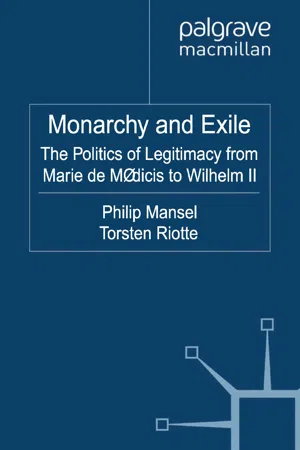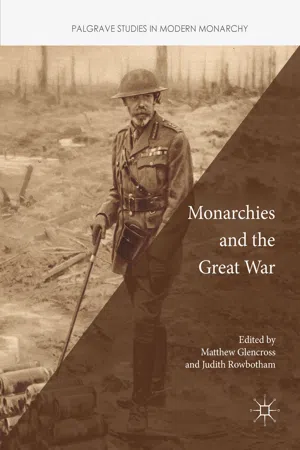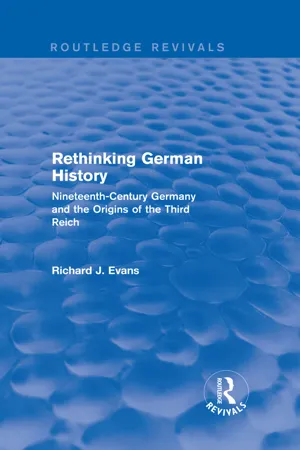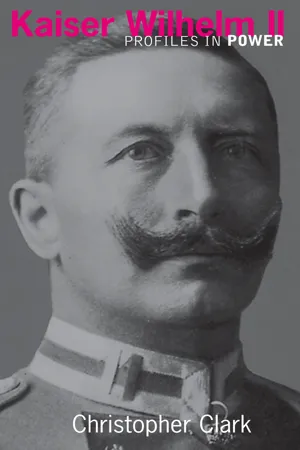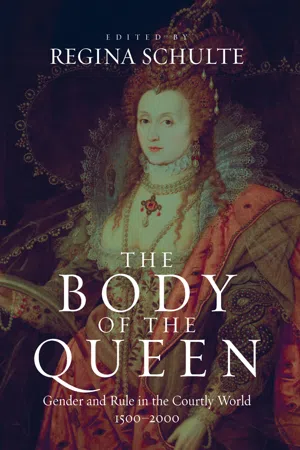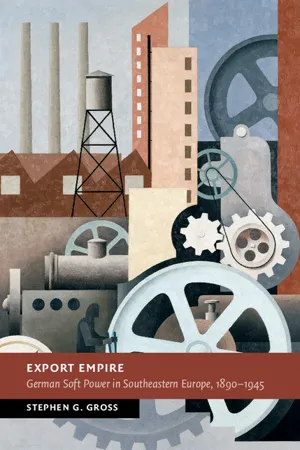History
Wilhelm II
Wilhelm II was the last German Emperor and King of Prussia, ruling from 1888 to 1918. He pursued an aggressive foreign policy, which contributed to the tensions leading to World War I. His reign saw significant social and political changes in Germany, and his leadership style and decisions have been widely debated by historians.
Written by Perlego with AI-assistance
Related key terms
1 of 5
8 Key excerpts on "Wilhelm II"
- eBook - PDF
Monarchy and Exile
The Politics of Legitimacy from Marie de Médicis to Wilhelm II
- P. Mansel, T. Riotte, P. Mansel, T. Riotte(Authors)
- 2011(Publication Date)
- Palgrave Macmillan(Publisher)
Nowhere was the clash between ancient and modern attitudes and beliefs more intense than in Imperial Germany. Kaiser Wilhelm II’s life (1859–1941) spanned the entire history of the first German nation state from Bismarck to Hitler. He was certainly not The Unicorn in Winter 349 representative of German society as a whole, but with his insistence on ruling personally in the manner of his 18th century Prussian ances- tors – the Great Elector, the Sergeant King and Frederick the Great – and with his overweening militarism and racial nationalism, his fundamen- talist Lutheranism and his contempt for parliamentary politics in all its forms, he personified those ‘feudal’ values that found themselves increasingly threatened by the rising tide of democracy as the twentieth century dawned. If we trace Wilhelm’s changing attitudes to his Jewish subjects – or rather to what he imagined them to be – from his child- hood through the great crises of his reign to the First World War, defeat, abdication and exile, we can pinpoint the years 1917/18 – the years in which revolution and Bolshevism came to Russia, and the United States of America entered the war, presaging the Hohenzollern Reich’s defeat and the global triumph of ‘western’ democratic values – as the moment at which ‘eliminatory’ anti-Semitism, always latent, raised its ugly head – and not just in the Kaiser’s mind. His personal trauma was no doubt particularly acute, but it was symptomatic of a crisis affecting the whole of the ‘dark continent’ of Europe, as subsequent events were only too clearly to show. 35 Notes 1. Daniel Chamier (1934), Fabulous Monster (London: E. Arnold). Barbara Dorothy Chamier was born in India in 1885 and died in England in 1971. 2. J. Daniel Chamier (1937), Ein Fabeltier Unserer Zeit: Glanz und Tragödie Wilhelms II (Vienna: Amalthea Verlag). 3. Nicolaus Sombart (1996), Wilhelm II: Sündenbock und Herr der Mitte (Berlin: Verlag Volk & Welt). - eBook - ePub
- Matthew Glencross, Judith Rowbotham, Matthew Glencross, Judith Rowbotham(Authors)
- 2018(Publication Date)
- Palgrave Macmillan(Publisher)
© The Author(s) 2018Begin AbstractMonarchies and the Great War Palgrave Studies in Modern Monarchy https://doi.org/10.1007/978-3-319-89515-4_3Matthew Glencross andJudith Rowbotham (eds.)End Abstract3. Crown Prince Rupprecht of Bavaria, the German Command and Kaiser Wilhelm II in 1914–1915
Introduction
Was Wilhelm merely a ‘shadow-Kaiser’, with real power vested in the traditional power structures of Prussia and Germany? Or did he exercise a decisive influence on political outcomes? Such questions have generated intense debate over a long period. The list of scholars who have taken part is a veritable ‘Who’s Who’ of the biggest beasts in the modern German history jungle.1 In essence, there are two main camps. On the one hand, some, like Professor John Röhl, believe that Wilhelm was either bad or mad, a proto-Hitler who led his country to destruction via a quasi-absolutist ‘kingship mechanism’.2 On the other, others believe that he had little real power.3 Within this tradition, one can distinguish between those, like Hans-Ulrich Wehler, whose interest in structures prevents them ascribing much importance to any kind of individual agency; and those, such as Christopher Clark, who maintain that Wilhelm did exercise agency. He operated, however, within a power structure so fluid and complex that it could only be controlled by a statesman of Bismarck’s calibre; since Wilhelm fell far short of that standard, he was unable consistently to exercise the executive prerogatives at his fingertips and to deliver any consistent programme or set of outcomes.This chapter is born out of a view that a gap remains in the existing scholarship. Specifically, although the role of the Kaiser in the outbreak of the First World War, while still contested, has been examined minutely, his involvement in the actual conduct of the war has been less deeply explored. The two best known recent biographies of Wilhelm II are those by Christopher Clark and John Röhl. The former dedicates 39 of his 367 pages to the First World War, compared with 50 to discussion of the Kaiser’s foreign policy role in the run-up to the war from 1909. In his third volume, Röhl spends proportionally even less space on wartime: 78 pages out of 1267, almost the same as he lavishes on Wilhelm’s exile and death. This compares with 128 detailing preparations for war in 1913 and 1914 alone. What work has been done on it tends to take a top-down view, drawing primarily on the evidence of the immediate entourage. - eBook - ePub
Rethinking German History (Routledge Revivals)
Nineteenth-Century Germany and the Origins of the Third Reich
- Richard J. Evans(Author)
- 2015(Publication Date)
- Routledge(Publisher)
So it is too with Wilhelm II, who, Professor John Röhl complains, has become something of an ‘unperson’ in recent scholarship on the Kaiserreich. 1 For a number of years Röhl has been seeking to rehabilitate the idea, once advanced by the liberal scholar Erich Eyck, that Wilhelm II was the dominant figure in German politics before 1914. The basis of this view has been provided by the papers of Wilhelm’s friend Philipp Eulenburg, which Röhl has edited with superb and meticulous scholarship. 2 Röhl’s latest contribution is as joint editor with Nicolaus Sombart of a collection of essays on Wilhelm II by various hands. 3 They are the product of a conference on the monarch which, in a faintly ridiculous act of self-indulgence entirely appropriate to its subject, the contributors arranged in 1979 in the bedroom of the Kaiser’s villa on the island of Corfu. In his two introductory papers to this well-produced and handsomely illustrated collection, Röhl seeks to rehabilitate Wilhelm II as the maker of German policy in his own time. Röhl is supported by his collaborator Thomas Kohut, who sees Wilhelm as having exerted ‘a lasting and decisive influence’ (p. 64) on German policy towards England. Kathy Lerman, too, in an essay on the Kaiser’s most effective Chancellor, Bernhard von Bülow, asserts that Bülow’s ‘whole system’ depended on his relationship with the Kaiser, whom he only ‘seemingly manipulated’ and whose will was only constrained by Bülow in relation to minor issues (p. 242). Röhl seeks to show that Germany before 1914 was personally ruled by the Kaiser, acting through an ‘inner circle of some fifty men in control of the destiny of this mighty state in the heart of Europe’ (p. 17). In this circle, which owed its existence almost entirely to the patronage of the Kaiser, social foibles and scandals could play a vital role in political advancement - eBook - PDF
Wilhelm II
Into the Abyss of War and Exile, 1900–1941
- John C. G. Röhl, Sheila de Bellaigue, Roy Bridge(Authors)
- 2017(Publication Date)
- Cambridge University Press(Publisher)
He took the view that Wilhelm was ‘too little King of Prussia and too much German Kaiser, an office of which he has forged a completely wrong notion, wrong by law, and wrong because it does not correspond to the feelings of his Germans. As a result he is constantly offending his [German] royal colleagues and the other German [non-Prussian] tribes, but also, and not least, offending the particular sensibilities of his Prussians themselves, especially among the classes who are his strongest supporters, the landed aristocracy and the conservative officials. His play-acting with mystical, mediaeval concepts that are dead or dying out makes him ridiculous.’ 4 The second volume of this biography gave a full account of the alarm with which the governing elite, the officer corps, diplomats posted in Berlin, parliamentarians, journalists and political parties of all shades of opinion were already reacting in the first years of Wilhelm II’s reign, when confronted with the absolutist arrogance of the young ruler. We saw how concerned they were at the decline of respect for the monarchy evident at all levels of society, and how from year to year indignation and displeasure at the Kaiser’s domineering and insulting demeanour grew. 5 The constant abuse of the Reichstag and the Prussian Landtag, the bloodthirsty speeches about the intervention in China, Wilhelm’s journey to England at the high point of the Boer War and many another provocation created turmoil on every side among the German people at the turn of the century. When Bu ¨low was appointed Reich Chancellor and Prussian Minister-President on 17 October 1900 he found himself confronted 128 Wilhelm II with the acute danger of a joint action by the federal princes and the Reichstag against the Kaiser which would threaten the very existence of the Hohenzollern Monarchy. As never before, the Crown was openly and directly criticised in parliament. - eBook - ePub
- Christopher Clark, Christopher (St Catherine'S College, University Of Cambridge) Clark(Authors)
- 2013(Publication Date)
- Routledge(Publisher)
Die Post declared that the ‘entire essence’ of the government’s Moroccan policy reflected ‘fearfulness, weakness of character [and] cowardice’:Is Prussia no longer itself? Are we become a nation of women? . . . What has become of the Hohenzollern, from whom sprang once a Great Elector, a Friedrich Wilhelm I, a Frederick the Great, a Kaiser Wilhelm I? The Kaiser appears to be the strongest pillar of French and British policy. . . . Guillaume le timide, le valeureux poltron!78This article did not command unanimous support, indeed it was widely condemned for its irreverence, but similar views were heard within the senior ranks of the military, where there was contemptuous talk of the ‘peace-Kaiser’ who had failed to defend the honour of his fatherland.79 In August 1911, the gifted young officer Erich von Falkenhayn, commander of a Guards regiment and a personal favourite of the Kaiser, observed in a letter to a friend that nothing would change in Germany as long as the Kaiser continued to be ‘determined to avoid the most extreme action’.80 In March of the following year, during the quiet spell that set in after resolution of the Moroccan crisis, he noted that the emperor remained ‘quite determined to maintain peace under any circumstances’, and added regretfully that ‘in his entire milieu there is not one individual who is capable of dissuading him from this decision’.81Wilhelm’s Impact
To what extent can Wilhelm be held responsible for Germany’s drift into deepening isolation during this era? In addressing this question we need to distinguish between the influence he could wield over the policy-making processes of the German government and his influence on the wider international environment within which German policy had to operate. We shall consider each in turn. - eBook - PDF
The Body of the Queen
Gender and Rule in the Courtly World, 1500-2000
- Regina Schulte(Author)
- 2006(Publication Date)
- Berghahn Books(Publisher)
The term first became politicised in the period preceding the Revolution of 1848: it referred to the humdrum citizen deaf to the idea of liberty, but also to the (regional) particularist horrified by the idea of the nation-state.’ 32 Wilhelm II, in contrast, was considered the very prototype of the anti-philistine. Rudolf Borchardt lauded the emperor, who ‘so detested going along with the trend of the moment’. Thus it is hardly surprising that Bülow’s bon mot about the emperor, ‘a philistine he is not’ was cited so frequently. 33 The emperor, even his critics admitted, was an original. 34 Wilhelm II’s speeches in particular – despite or precisely because of the criticisms of them – were viewed as expressions of his individuality. Royal speeches had been introduced into Prussia by Friedrich Wilhelm IV. The degree to which Wilhelm II used the medium to express his opinions, however, was doubtless wholly novel. 35 Contemporaries recognised this, too. Alfred Kerr presented Wilhelm as somebody who knew ‘how to enjoy life’, for he expressed his world-view uninhibitedly in extemporaneous speaking and saw ‘these statements immediately disseminated to all corners of the earth’. 36 In his speeches, Kerr believed, one could find ‘Wilhelm the Second’s strong sense of individuality, which had so often been confirmed’. 37 For his contemporaries, the monarch was not just a man with every opportunity to realise himself, but above all someone who made use of these opportunities. As a newspaper wrote on the occasion of his fiftieth birthday, the Kaiser was a man who could ‘live his life’ as ‘his high spirits dictated’. 38 ‘Self-enjoyment’ and ‘self-gratification’ ( Selbstvergnügen and Selbstgenuß ) were regarded as two The Unmanly Emperor: Wilhelm II 259 of Wilhelm’s II character traits. 39 To the extent that individuality was deemed a sign of modern times, a ‘complicated character’ was certainly no disgrace. - eBook - PDF
- Matthew Jefferies(Author)
- 2020(Publication Date)
- Red Globe Press(Publisher)
5 Here, therefore, Wilhelminism is used more nar-rowly to refer only to the Empire’s official culture in the reign of Wilhelm II. Some aspects of this were dealt with in Chapter 2, and further examples follow. This chapter seeks to demonstrate, 183 however, the extent to which the character and values of Wilhelm II’s official culture became contested and opposed in the years around 1900: not only from within the ranks of the socialist labour movement and of organized Catholicism, but amongst patriotic middle-class Protestants too. The challenge came in a variety of forms, not only from the pens of satirists and cartoonists who savaged the Kaiser and his pet projects with unprecedented ferocity; but also from a bewildering array of cultural critics, prophets, and reform leagues, each clamouring to be heard; and from the rapid emergence of a new mass culture, based on commercial calculation rather than aesthetic contemplation. Each of these is featured over the following pages. Wilhelm II’s Kunstpolitik ‘The broad and varied area which comes under the jurisdiction of the Kultusministerium – art, research, medicine etc. – is something I have always followed with lively interest, and always sought to promote’. 6 When the former Kaiser’s memoirs were published in the 1920s, this solitary bland sentence represented virtually the only comment on the many cultural controversies that had stirred during his reign. Some have taken this as a sign that Wilhelm’s apparent interest in aesthetic issues was never more than skin-deep. When the Kaiser spoke, Rudolf Pfefferkorn has suggested, he was merely expressing the views of others, such as Anton von Werner. 7 However, as Peter Paret and Martin Stather have shown, 8 the extent of Wilhelm’s handwritten notes in the margins of the many art-related papers and architectural plans laid before him, often at his own request, would seem to indicate otherwise; as would his fre-quent attempts to exercise his own modest creative abilities. - eBook - PDF
Export Empire
German Soft Power in Southeastern Europe, 1890–1945
- Stephen G. Gross(Author)
- 2016(Publication Date)
- Cambridge University Press(Publisher)
Part I German power in the Wilhelmine Empire and the Weimar Republic 1 The legacy of Wilhelmine imperialism and the First World War, 1890–1920 The Germans excel in the sedulous adaptation of their manufactures to local needs, high and low. They are quick to take account of differences in climate, of taste and custom, and even superstition . . . And with equal patience they get to know enough of the business affairs of individual traders to be able to sell with relatively small risk on long credit, where Englishmen sometimes demand prompt payment. In all this they are much aided by their industry in acquiring languages of Eastern Europe, Asia, and South America. Even in markets in which English is spoken they push their way by taking trouble in small things to which the Englishman will not always bend. 1 Before 1914 the empires of Europe governed nearly two-thirds of the world’s population. These empires differed vastly from one another: Britain’s multifaceted imperial system with its dominions and its crown jewel of India seemed a world apart from Portugal’s maritime posses- sions or the vast Eurasian land imperium of Russia. And these empires had changed over the course of the long nineteenth century, as Euro- peans carried out wave after wave of territorial annexation in Africa and Southeast Asia, and as they presided over an explosion of global trade, international investment, and migration that connected imperial cores and peripheries in ever denser webs of entanglement. By the early twen- tieth century, across much of the globe imperial rule of one form or another was the norm rather than the exception. 2 Germans came late to the struggle for empire. Even after Prussia uni- fied Germany in 1871 relatively few intellectuals or politicians displayed serious interest in acquiring overseas colonies or expanding German ter- ritory within Europe.
Index pages curate the most relevant extracts from our library of academic textbooks. They’ve been created using an in-house natural language model (NLM), each adding context and meaning to key research topics.
